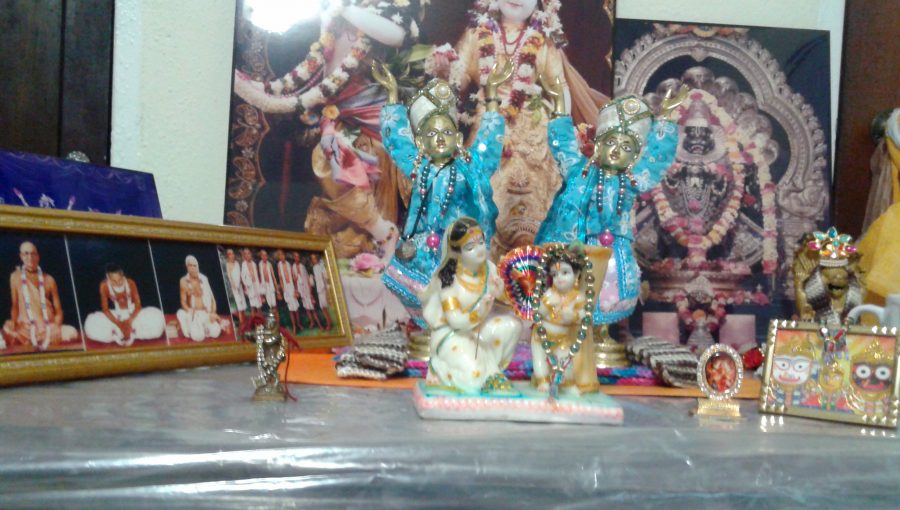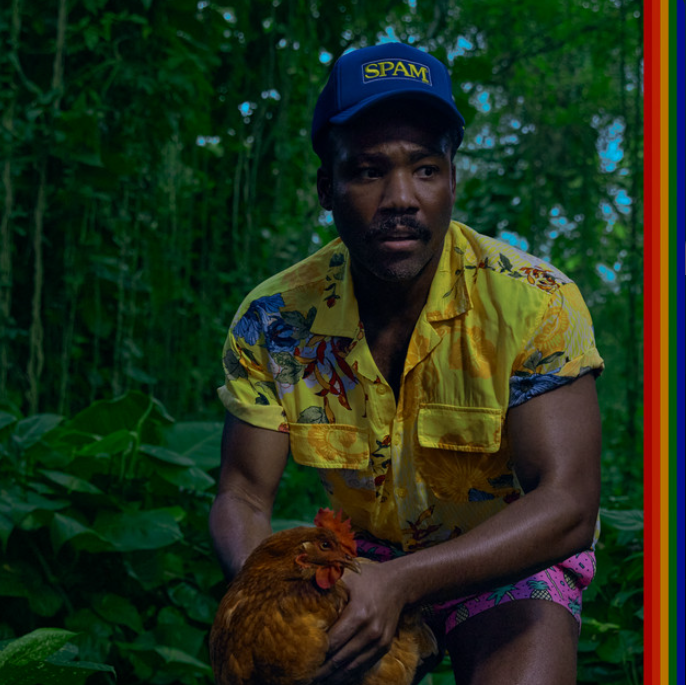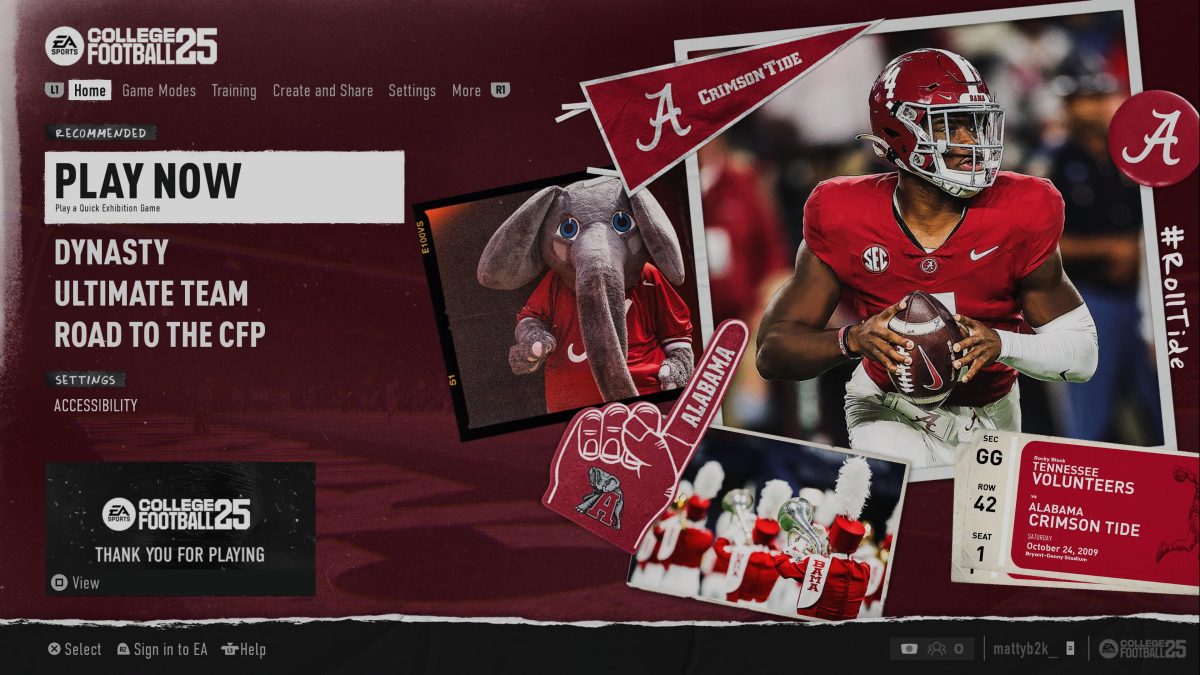Nagaraj and his wife kneel before an altar in their apartment, chimes ringing in the air. Laden with colorful deity figurines and ornate art, the altar, or mandir, acts as a small temple for the Hegdes and a vital aspect of their religion, Hinduism.
Unlike the many churches that fill the Tuscaloosa landscape, the approximately 400 Indians (many of whom are Hindu) primarily worship at small mandirs in their own homes, as mass gathering is not emphasized.
“A mandir is a place where we can surrender our mind; it’s a small set-up … this home is an extension of the temple,” said Nagaraj Hegde, UA Vedic Society president and Ph.D. student. “Even though the television waves are everywhere, we still need a TV set to capture it and play it back. We understand that divinity is everywhere, but these are concentrated forms where the deity is present.”
Before eating, his wife placed food on the mandir.
“We offer prayers; we worship them,” Hegde said. “We offer the food, whatever we eat, before, to the divine beings – pray to them please will you accept it, and we will take the remnants.”
In addition to domestic mandirs, there is a modest temple in Tuscaloosa and a larger one in Birmingham, which has a larger population of Hindus. People gather there every Sunday.
“Once in a week it’s good to meet each other,” said Parnab Das, a Ph.D. student at the University. “They give good, home-cooked vegetarian food. We do a small worship service, and we discuss things from our scriptures. We try to discuss not only religious things. We try to discuss social things going on in this world. Just try to inspire each other what we should and should not do in our life.”
Though a mere fraction of the population, Indians in Tuscaloosa are a close group kept together through cultural practice and traditions.
“We are very much closely bound,” said Vaishali Batra, president of the Indian Student Association of Tuscaloosa and Ph.D. student. “We do a lot of events together, a lot of social gatherings together. We always make it a point that we get together on Indian cultural festivals. We also meet the senior citizens and families, so we are very well-knit in Tuscaloosa.”
As is natural with intercultural interaction, Hindus in Tuscaloosa sometimes have to deal with misconceptions and misunderstandings from Americans and other non-Indians, such as the name Hindu itself. Most likely coined by Persians, Hindu merely referred to people living on the Sindhu River. The original name of the religion is Sanatana Dharma.
“Sanatana means eternal and Dharma means law or the way, so Sanatana Dharma means the eternal way or eternal law of being close to God,” Das said.
Even then, Das clarifies that Hinduism is more of a way or law of life than a religion.
Das and Nagaraj Hegde have faced some negative experiences during their time as students here as well.
“I was being asked by one of my lab mates that after death, if I go to hell because I am not a Christian, and it is being written in the Bible that if you are not a Christian you go to hell, what will I do?” Das said. “So I said, then I will go to hell – what else can I do? If God cannot see the deeds which I have done in my life, if God cannot see my love towards him, if God cannot see my dedication towards him, if still he asks me to go to hell because I am not a Christian, then I have to go to hell.”
Nagaraj Hegde shared a similar story.
“Once, four years ago, we were singing Indian kirtan on Manderson Landing, and within 5 minutes, someone said you can’t do it here,” Hegde said. “But it’s really improved a lot. Last year, every single Thursday in the summer, we have done it and nobody bothered us.”
The positive change in the past few years hints at some of the positive relationships Hindus have in the community. For example, Hegde’s Vedic Society seeks to educate Americans and other non-Indians about Hindu and Indian traditions and beliefs like yoga, meditation and universal harmony.
“I try my best to present the real knowledge without adding my own interpretations and present the knowledge as Krishna presented it,” Hegde said. “We try to bring about harmony in this world. We get Christians, we get Muslims, we get atheists, every type of person, and we don’t exclude against anybody.”
Some new international students struggle to become acclimated to Alabama and find their way around, especially since few have cars. Batra and ISAT seek to help with that.
“Our organization on campus is about uniting people and helping new students as well as the older students to settle down here or to help them with the basic things they need in the beginning or give them campus tours,” Batra said. “And this organization is about organizing Indian festivals so that students can have the feel of home when they are away from home.”
Hindus and Indians have formed a community in Tuscaloosa that maintains cultural and religious ties while simultaneously interacting with and befriending others across the city.
“Initially it was hard – it was very hard – but once I started the Vedic Society meetings then I made such wonderful friends, such nice people I could never imagine; I feel at home,” Hegde said. “I have many nice friends. There are nice people everywhere. You just have to go and find them. You think ‘oh this is bible belt they will be close-minded,’ but that’s not a fact.”







